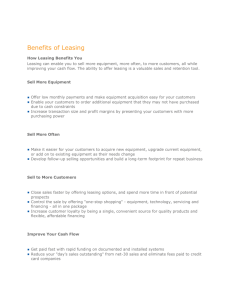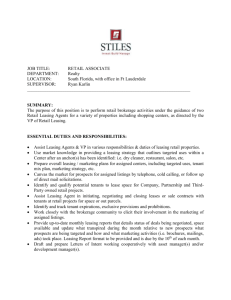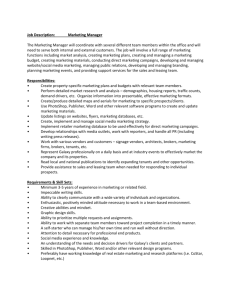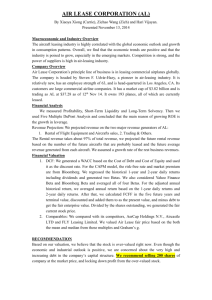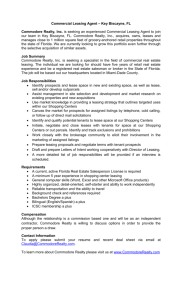influence of leasing company image on the leasing package sales
advertisement
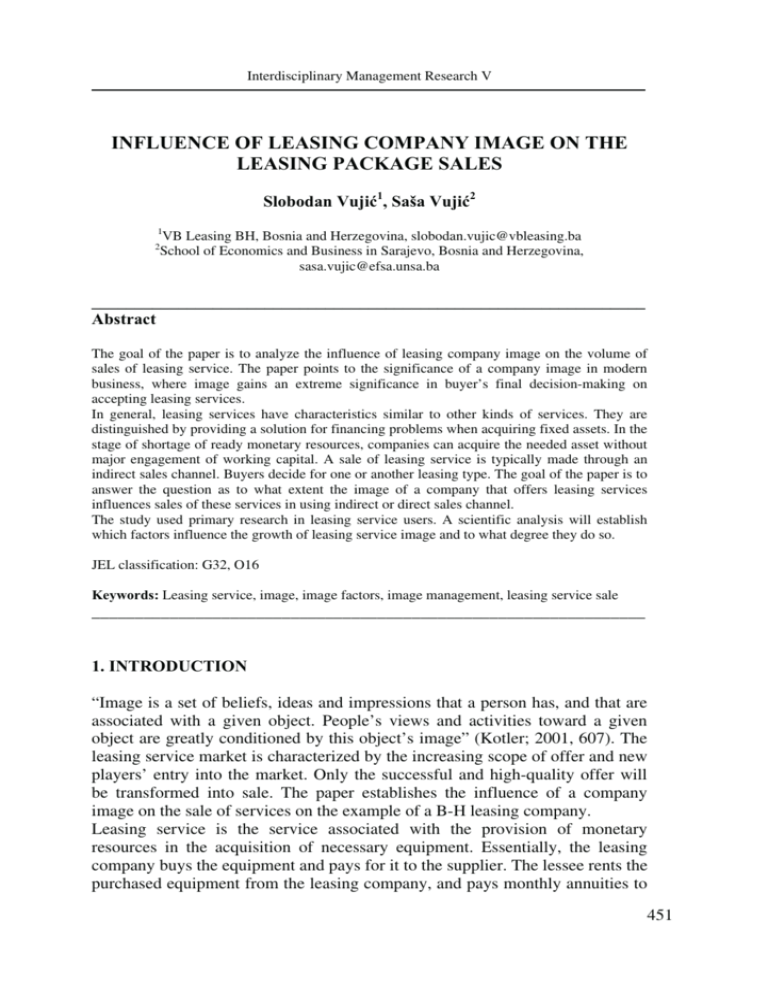
Interdisciplinary Management Research V INFLUENCE OF LEASING COMPANY IMAGE ON THE LEASING PACKAGE SALES Slobodan Vujić1, Saša Vujić2 1 2 VB Leasing BH, Bosnia and Herzegovina, slobodan.vujic@vbleasing.ba School of Economics and Business in Sarajevo, Bosnia and Herzegovina, sasa.vujic@efsa.unsa.ba ________________________________________________________________ Abstract The goal of the paper is to analyze the influence of leasing company image on the volume of sales of leasing service. The paper points to the significance of a company image in modern business, where image gains an extreme significance in buyer’s final decision-making on accepting leasing services. In general, leasing services have characteristics similar to other kinds of services. They are distinguished by providing a solution for financing problems when acquiring fixed assets. In the stage of shortage of ready monetary resources, companies can acquire the needed asset without major engagement of working capital. A sale of leasing service is typically made through an indirect sales channel. Buyers decide for one or another leasing type. The goal of the paper is to answer the question as to what extent the image of a company that offers leasing services influences sales of these services in using indirect or direct sales channel. The study used primary research in leasing service users. A scientific analysis will establish which factors influence the growth of leasing service image and to what degree they do so. JEL classification: G32, O16 Keywords: Leasing service, image, image factors, image management, leasing service sale ________________________________________________________________ 1. INTRODUCTION “Image is a set of beliefs, ideas and impressions that a person has, and that are associated with a given object. People’s views and activities toward a given object are greatly conditioned by this object’s image” (Kotler; 2001, 607). The leasing service market is characterized by the increasing scope of offer and new players’ entry into the market. Only the successful and high-quality offer will be transformed into sale. The paper establishes the influence of a company image on the sale of services on the example of a B-H leasing company. Leasing service is the service associated with the provision of monetary resources in the acquisition of necessary equipment. Essentially, the leasing company buys the equipment and pays for it to the supplier. The lessee rents the purchased equipment from the leasing company, and pays monthly annuities to 451 Interdisciplinary Management Research V the leasing company for the renting service. In B-H, leasing services are typically sold through the indirect sale channel, whereby individual buyers decide for one or another leasing type. The subject of research itself provides the answer to the question as to what extent the image of the company providing leasing services affect these services sales when using direct and indirect sales channels. “Understanding image and significance for public opinion is important insomuch as it is through them that an organization communicates with all its stakeholders …” (Corley&Cohran&Comstoc;2000) 2. CONCEPT OF LEASING SERVICES AND LEASING SALES CHANNELS Leasing service is the financing of a leasing arrangement user in purchasing equipment, which can include: various machines for manufacturing, trucks, cars, buses, passenger vehicles, IT equipment, machinery for construction, agriculture, forestry, etc. Leasing can be defined as a contractual relationship between two parties, the user (lessee) and the owner (lessor) of assets that are the subject of the leasing arrangement, whereby the user acquires the right to use the assets and takes on the obligation to make a series of periodical payments to the owner, i.e. the leasing company during the leasing period (Tvrtković;2002., 13). Basic leasing services are (Vujić; 2006, 19): 1. Operational leasing – is developed through the: ‘use, return and take a new one’ motivation. In the operational leasing, there is no transfer of ownership over the object of the lease. Upon the termination of the agreed leasing term, the lessee returns the object to the lessor, which the latter can sell or re-lease. 2. Financial leasing - is based on the: ‘Use it and keep it’ motive. This form of leasing immediately provides for taking over the ownership of the leased property, but only upon the expiration of the agreed term. 3. Sell it and lease it back - In order to improve liquidity and obtain cash, companies frequently sell their capital asset to a leasing company and then lease the same asset for use. In this way the company obtains cash and keeps using the same asset. Following participants appear in the leasing service sales channels: Manufacturer of the leased property (cars, freight trucks, cranes, a) construction machinery, manufacturing machinery and equipment, etc.), b) Merchants (dealers), who sell leased property, c) Buyers – legal persons (registered companies) – lessees, d) Buyers – natural persons (citizens, individuals) – lessees, e) Leasing companies – lessors. 452 Interdisciplinary Management Research V Sales or distribution channels can be formed as: a) Direct sales channel, where the buyer turns to the manufacturer in order to purchase the equipment, include the leasing company only in the part of the purchase financing, while the buyers select the necessary equipment or machines or the asset themselves. This channel can mostly be used by larger manufacturers, when buying a greater number of machines or a higher value. Indirect sales channel, when buyers – legal persons or buyers – natural b) persons address the dealers with the desire to purchase suitable machine, equipment or car. To finance the purchase, the buyer can use the leasing arrangement of any leasing company. The dealer has offers of various leasing companies, and the end buyer thus independently selects the leasing service of this or that leasing company. 3. INFLUENCE OF A LEASING COMPANY’S IMAGE ON LEASING SERVICE SALES Image is a set of beliefs, attitudes and impressions that others have about us. We can speak of the image of a company, person, product, retail store, etc. In our case, we will discuss the image of a leasing company. “Overall, a series of perceptions influences the creation of image. Image is a general perception of a product or enterprise, created based on information and experiences, and previous consumption. Image is a very important concept in the modern marketing, since the success of the entire company, new product, competitive relations, prices, etc. often depend on it”( Tihi&Čičić&Brkić; 2006, 169.) . “Enterprise image is the overall impression of an enterprise represented by its identity and all its other identifiers significant for the target audience. Enterprise image is an overall picture of an enterprise which encompasses attitudes, views, experiences, beliefs, prejudices and feelings that individual public groups (consumers, dealers, financers, suppliers and the broadest public) have about the enterprise. Enterprise image is a means which projects the picture of the enterprise, which communicates and transmits the enterprise values to the target segment. Enterprise image is essentially an impression of the enterprise based primarily on the enterprise identity. Based on its image, an enterprise is usually recognized and the whole organization, its operations and products are evaluated” (Kesić; 2003, 107). “Corporation image as such has two major components: a functional and emotional one respectively. The functional component is associated with palpable characteristics that can be measured easily, while the emotional component is associated with the psychological dimension that is manifested through feelings”(Leblanc; 2001). The supplier is constantly faced with the question as to what will stimulate a buyer to buy our product when numerous similar or same products are being 453 Interdisciplinary Management Research V offered. Image is what will ultimately influence the buyer to buy a specific product. “Mr. David Ogilvy’s idea is that brands have their own personality and their own image that is reflected in that the sale itself is determine not only what is actually offered by products and services but rather what people or reference groups this about this product or service. In the marketing terminology, products and services offer both functional and psychological advantages of satisfaction”(Dowling; 2001, 17). Leasing company image is the overall picture of a leasing company that encompasses attitudes, views, experiences, beliefs, prejudices and feelings that dealers, customers-legal persons, customers-natural persons, potential buyers (companies and citizens), suppliers, bankers and entire public have about the company. “Corporate image is a junction of beliefs and emotions about an organization”(Dowling; 2001, 19). In its positioning strategy, a leasing company should use the criterion of distinguishing its offer from the others. In order to highlight the differences in the offer, a leasing company uses the type or manner of the service not offered by the competition. If the competition does offer the same kind of service, the leasing company offers it in a better and different way. Emphasizing the difference crates the impression of significant differences in the leasing offer, although they are basically minimum or even insignificant in creating convenience. It is generally believed that only one difference should be promoted. This is based on the fact that customers and prospects remember only “number one”. Results of the research into the overall company image determined factors that are the most significant for the overall image of a leasing company. The significance of an individual factor for the overall company image was ranked according to the number of responses (as percentage) classified into two groups: the first group (important, very important, extremely important), and the second group (unimportant or slightly important). The first group consists of the first five factors that have the same significance for the overall image. All the respondents described these factors as important, while none claimed that it is unimportant or slightly important. The second group includes factors with a great number of responses describing them as important, very important, and extremely important. The third group is made up of the following factors: price of the service, innovation (product in step with time) and additional services. The first group consists of the following five factors: speed in processing applications, public relations, simple procedures and forms, professionalism, and grace period. These five factors have an approximately equal influence on the overall leasing image, and it therefore makes no difference which one of them a leasing company will use in promotion as the “number one” in B-H. Other factors also lead to image increase and can be used for advertising purposes: longest payment period, smallest number of guarantors, highest454 Interdisciplinary Management Research V quality service, simplest security, lowest price of the service, the greatest number of additional services. Table 1. Order of significance of individual factors for the overall image of VB LEASING BH company is (Vujić; 2008, 161-171): Rank FACTOR 1. 2. 3. 4. 5. 6. 7. 8. 9. 10. 11. 12. 13. Application processing speed Public relations Simple procedures and forms Professionalism Grace period Payment term Number of guarantors Service quality Marketing communication Type of collateral Service price Innovation (up-to-date product) Additional services FIRST GROUP SECOND GROUP important, very important, extremely important 100% 100% 100% 100% 100% 98,9% 98,9% 98,6% 97,8% 97,8% 92,5% 92,0% 90,2% not important, slightly important 0% 0% 0% 0% 0% 1,1% 1,1% 1,4% 2,2% 2,2% 7,5% 8,0% 9,8% The good, quality and favourable image of a leasing company has effect on: increase in service value, accurate focus on the company, which cannot be confused with similar messages by competition. It also affects customers’ awareness and perception that they will solve their problem by using the service provided by the particular leasing company. In this way, a leasing company presents itself to public and is distinguished from competition. 4. MANAGING LEASING COMPANY IMAGE In modern world business trends, competition for customers in the field of nonprice elements is increasing. If companies want to survive in the market and be successful, they must use the marketing strategies that are not easy to emulate. One of few things that competition cannot “take over” and emulate is the wellconceived image. In modern world business trends, competition for customers in the field of nonprice elements is increasing. If companies want to survive in the market and be successful, they must use the marketing strategies that are not easy to emulate. One of few things that competition cannot “take over” and emulate is the wellconceived image. 455 Interdisciplinary Management Research V Management of leasing company image includes following activities: a) Planning image (analysis of the existing image, setting image goals, defining measures and activities, determining alternatives, etc.), b) Organization of activities in achieving image, c) Defining human resources in conducting image-related activities, d) Carrying out and implementation of planned activities, and e) Control of carrying out the plan, particularly of achieving the set image goals. In a leasing company, image is managed through following stages: analysis of present image, a. b. analysis of present conditions in actual operations, c. establishing differences (if there are any), d. setting goals in terms of the company’s image, e. setting alternative goals and assessments, f. making the final decision about image goals, g. conducting activities in actual operations, h. conducting activities in communication, i. control of carrying out the plan and planned image goals, and j. possible corrections in carrying out the set plans and image goals of the leasing company. Successful methods for analyzing the competitiveness of a leasing company image are SWOT analysis, and Benchmarking (Babić;2004,289). Through SWOT analysis, the leasing company learns about the strengths and weaknesses of its own image, as well as about opportunities for improving it and threats to the future image. Benchmarking is the analysis of competitiveness. It implies a continued process of comparing one’s own products and procedures with best solutions by competition, aimed at improving one’s own operations and increasing image. Based on the comparison between the desired image goal and the actual image, controllers (typically top manager) undertakes appropriate activities: If deviations are negative, i.e. if the planned tasks are not carried out, a. measures and actions are taken to turn the trend of carrying out the planned image goals towards the achievement of the planned goals, and b. If the deviation is positive, and if the planned image goals are being achieved, they should support the activities in order to contribute to even better achievement of goals, i.e. to raise the leasing company image. “A customer is mostly affected by the created perception of an enterprise image; it determines which enterprise he will select, and the loyalty to the selected enterprise. Owing to this, goals of the image strategy are creating differentiating advantages (emphasizing features by which a company is distinguished from others), building desired reputation, and gaining and 456 Interdisciplinary Management Research V retaining customers’ trust, which directly results in the company’s survival in the market, and thus in its profitability”(Babić;2004,23). “People create ties with companies and place them, in their perception, to given positions. Others may see the same companies in an entirely different light” (Spector; 1961). Through image, a leasing company communicates with public, i.e. public learns what the company is involved with, how it operates, what quality of products or services it offers, what its overall reputation is. 5. CONCLUSION The paper points to the significance of a company image in modern business, where image gains an extreme significance in buyer’s final decision-making on accepting leasing services. A leasing company’s image is decisive in the supply and sales of leasing arrangements. It is therefore extremely important for a leasing company to improve its image. Existing customers and prospects can solve the problem of financing the purchase of cars, machinery, equipment, etc. through a leasing arrangement of a particular leasing company. Using the collected data and results of the research, we can see that a company’s image can be improved through: - increasing the application processing speed, - improving public relations, - maximum simplicity of procedures and forms, - increased professionalism, - introducing the grace period, - longer terms of payment, - smaller number of guarantors or not requiring guarantors, - increasing service quality, - improving marketing communications, - accurately determining of the type of collaterals and decrease thereof, - adjusting the service price to its scope and quality, - supporting innovation and constantly introducing new, up-to-date services, and - providing additional services (free technical check-up, servicing, etc.) Besides introducing actual services,, which will be provided fast and efficiently, it is necessary to continually develop marketing communication so that a broader circle of prospects could learn about our services in the field of leasing and create a favourable image of the leasing company. In improving our image, it is necessary for the messages to prospects and public correspond with the actual conditions in providing services so that the public and prospects could identify the messages with the actual conditions. 457 Interdisciplinary Management Research V It can be concluded that a company’s image affects the sales of leasing arrangements through factors with varying intensity of influencing the overall image of a leasing company. Based on this paper, it is possible to focus on specific areas of leasing company operations in order to improve the overall image. It should also be noted that the improvements must be made within individual factors, since the overall image is a sum of all the individual factors. REFERENCES 1. Aron J. Spector, A. J. (1961) Basic dimensions of the Corporate image, Journal of marketing 2. B. Tihi, M. Čičić, N. Brkić, eds., „Marketing“, Sarajevo, 2006., Ekonomski fakultet, p. 169. 3. Babić, M. (2004) Korporativni imidž, Adamić, Rijeka 4. Corley, K. G., Cohran, P. L., Comstoc, T. G. (2000) Image and the impact of public affairs management on internal stakeholders” Journal of Public Affairs, Pennsylvania 5. Dowling, G (2001) Creating corporate reputations, identity, image and perfomance, Oxford University press, New York 6. Kotler, P. (2001) „Upravljanje marketingom“, Mate, Zagreb 7. Leblanc, G. (2001) Corporate image and corporate reputation in customers retention decision in services“, Journal of retailing and consumer services 8. 8. Tanja Kesić, T (2003) Integrirana marketinška komunikacija, Opinio, Zagreb 9. Tvrtković, S. (2002) Finansiranje lizing aranžmanima , Revicon Sarajevo 10. Vujić, S. (2006) Uticaj imidža kompanije na prodaju usluga pri korištenju indirektnog kanala prodaje na primjeru leasinga-a , Sarajevo Magistarski rad, Ekonomski fakultet Sarajevo 11. Vujić, S. (2008) The Image of Leasing Services as a Factor in Increasing Investment Activity in Countries in Transition, Naučna konferencija Izazovi ekonomske nauke u 21. vijeku, Beograd, pp. 161171 458
